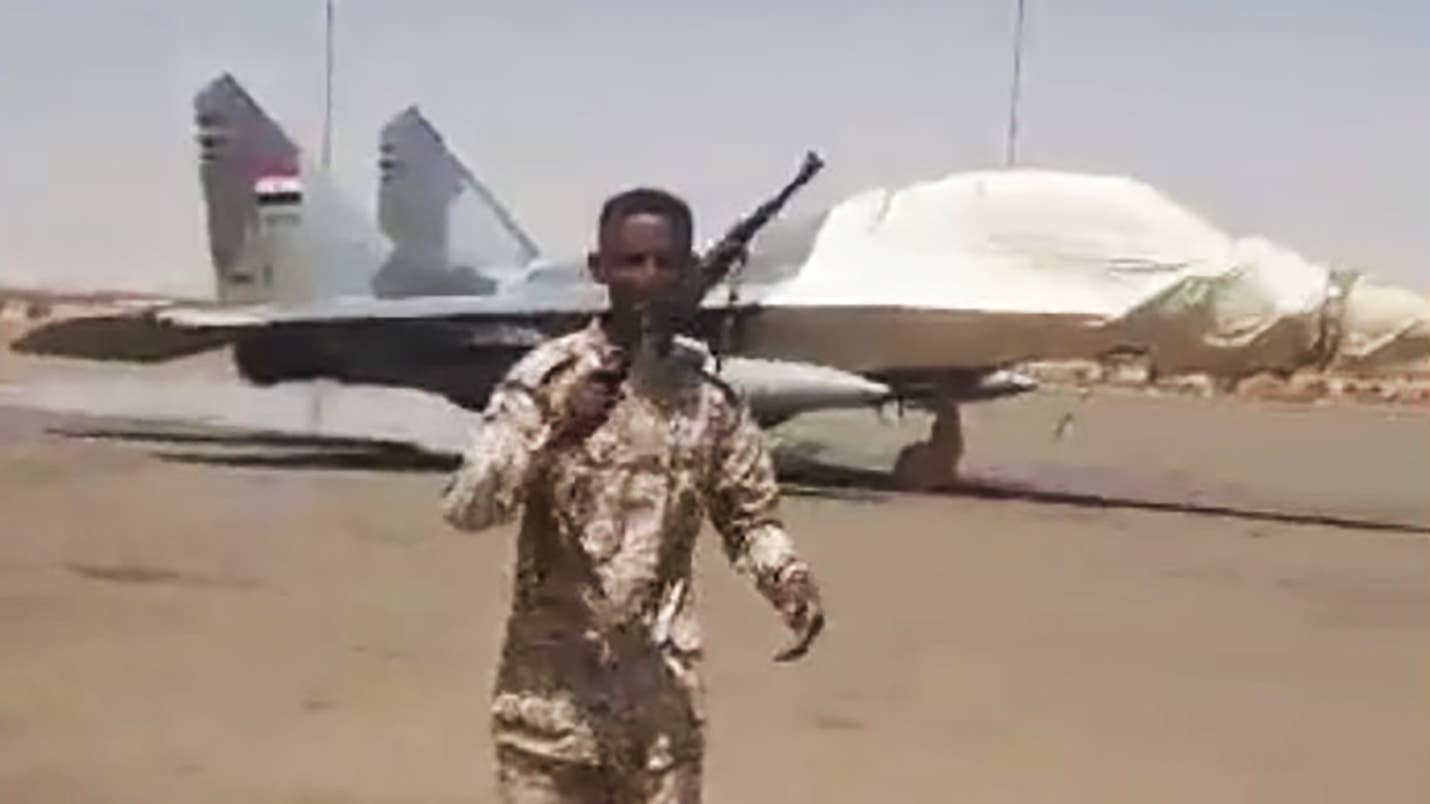The fallout of the growing crisis in Sudan has led to the capture of some of Egypt’s advanced MiG-29M/M2 fighters deployed in the country.

As fighting between rival government factions intensifies across much of Sudan, the paramilitary Rapid Support Forces, or RSF, recently claimed to have taken control of an airbase in the north of the country where Egypt has deployed MiG-29M/M2 Fulcrum multirole fighter jets. The status of the jets and the airbase are currently unclear, with the confused situation being typical of the violence in Sudan, which has now reportedly claimed at least 97 lives and injured many more.
The RSF is currently engaged in fighting Sudanese military units loyal to Gen. Abdel Fattah al-Burhan, the head of Sudan’s transitional governing Sovereign Council. The RSF leader, Gen. Mohamed Hamdan Dagalo, known as Hemedti, is also the deputy head of the Sovereign Council. With these two leaders sharing power, it had been planned that the RSF would merge with the regular army.
With those plans now in tatters, a video released by the RSF on Saturday afternoon showed what it claimed was the capture of Merowe (also known as Marawi) Air Base, around 186 miles north of the Sudanese capital Khartoum. While this is a Sudanese Air Force base, it was hosting an unknown number of Egyptian Air Force MiG-29M/M2 jets at the time.
There are numerous reports stating that these aircraft, together with Egyptian military personnel, were deployed to Merowe Air Base to take part in joint exercises, namely the Nile Eagles-2 joint maneuvers, which took place in March. However, there are also suggestions that the Egyptian MiGs are more of a permanent presence at the base, which would explain why the contingent was still in Sudan at this time, despite those maneuvers having ended, although why they were not flown out once the situation began to deteriorate remains unclear.
The video shows multiple members of the paramilitary RSF posing in front of the Egyptian MiG-29s, at least three of which can be seen outside on the airfield, with another two in a hangar. None of the jets appear to be carrying any weapons. The RSF fighters raise their guns in the air in celebration and there are apparent sounds of gunfire in the vicinity, as well as a pall of black smoke in the background.
A photo released over the weekend additionally shows what are claimed to be “dozens” of Egyptian Air Force personnel who were captured by the RSF at Merowe Air Base, including “several” MiG-29 fighter pilots. There are reports, too, that the RSF captured members of the Egyptian Army’s El-Sa’ka special forces group. The RSF said it was willing to cooperate with Egypt over the return of Egyptian troops, who the militia said had handed themselves over to the group in Merowe.
Egypt’s fleet of MiG-29M/M2 jets are among the most capable versions of the Fulcrum in service anywhere in the world. In fact, these aircraft — the single-seat MiG-29M and two-seat MiG-29M2 — are basically identical to the MiG-35 and MiG-35UB, the top-of-the-line Fulcrum variants developed for Russia.
Egypt received 46 MiG-29M/M2 fighters after placing an order in 2015. These aircraft are equipped with a Zhuk-M1SE mechanically scanned array radar and can carry a T-220 targeting pod. The wide array of weapons options includes active-radar R-77 (AA-12 Adder) air-to-air missiles, subsonic Kh-35 (AS-20 Kayak) or supersonic Kh-31A (AS-17 Krypton) anti-ship missiles, Kh-31P (AS-17 Krypton) anti-radiation missiles, as well as KAB-500Kr TV-guided bombs.
Acquisition of the advanced MiG-29s from Russia was just one part of a significant modernization program for the Egyptian Air Force. In recent years, Cairo has also bought Dassault Rafale multirole fighters from France, both these types joining the large numbers of F-16s and Mirage 2000s that otherwise make up the air force’s fighter arm. However, the Sukhoi Su-35s that were ordered from Russia appear unlikely to ever be delivered to Egypt, with multiple reports suggesting that pressure applied on Cairo by the U.S. government has derailed the deal. Instead, the Su-35s are expected to be transferred to Iran.
While the current situation on the ground at Merowe is unclear, there have been unconfirmed reports that the airbase is now back under the control of government forces. However, the situation in the country is certainly precarious and the jets are likely considered vulnerable unless they can be returned to Egypt sooner rather than later.
Overall, the events at Merowe Air Base are just one facet of a fast-developing crisis in Sudan.
While diplomatic efforts to bring an end to the fighting have stepped up since the weekend, fighting between the rival government factions has only increased since this morning.
Sudanese greet army soldiers, loyal to army chief Gen. Abdel Fattah al-Burhan, in the Red Sea city of Port Sudan on April 16, 2023. Photo by AFP via Getty Images
The capital, Khartoum, has seen particularly heavy fighting, including around key installations such as the international airport, the presidential palace, and the armed forces headquarters — thought to be where Burhan is located.
An annotated sate little view of the fairly widespread destruction at Khartoum International Airport in Sudan, with multiple aircraft — include two Il-76s, a 737, an A330 and a turboprop aircraft — totally destroyed. PHOTO © 2022 PLANET LABS INC. ALL RIGHTS RESERVED. REPRINTED BY PERMISSION
In fact, Sudanese Air Force MiG-29 jets have been noted flying combat missions at low level over the capital, beginning this weekend, with video posted to social media apparently showing them launch air-to-ground missiles or rockets. Sudan’s MiG-29s are significantly less advanced than the MiG-29M/M2s flown by Egypt, but the dozen or so aircraft are still among the most capable available to Khartoum.
A Sudanese Air Force MiG-29 over Khartoum, as smokes rise following clashes in the Sudanese capital on April 16, 2023. Photo by Omer Erdem/Anadolu Agency via Getty Images
Meanwhile, there are accounts of further airstrikes by the Sudanese Air Force against RSF bases in Omdurman, Khartoum’s sister city located on the other side of the Nile.
As well as in Merowe, there have been reports of clashes in different parts of Darfur state and in the country’s eastern region, including the provinces of Kassala and al-Qadarif on the borders with Ethiopia and Eritrea.
The World Food Program (WFP) yesterday announced a temporary suspension of its operations in Sudan after three agency employees were killed in violent clashes the previous day and one of the aircraft used by the WFP was damaged.
Generally, the regular Sudanese military that are sided with Burhan are judged to have better equipment, including heavy weapons, with so signs so far that the Sudanese Air Force has been flying missions on behalf of Hemedti’s RSF.
However, both sides in the fighting are making claims and counterclaims that are hard, if not impossible, to verify independently. In a measure of the confusion that exists at this point, Sudan’s state television channel shut down its broadcasts yesterday afternoon, in an effort to prevent the RSF from broadcasting propaganda, as fighting for the control of capital continued.
The current fighting emerged from the aftermath of the regime of Omar al-Bashir, an autocratic Islamist leader who took power in Sudan in 1989. In 2019, forces of the regular Sudanese military joined up with the RSF in a successful effort to oust Bashir.
Gen. Abdel Fattah al-Burhan, the head of Sudan’s transitional governing Sovereign Council (left) and the RSF leader, Gen. Mohamed Hamdan Dagalo, known as Hemedti. Photo by YASUYOSHI CHIBA,ASHRAF SHAZLY/AFP via Getty Images
But there were always tensions between the two sides. The RSF has its roots in the infamous Janjaweed militia that was accused of genocide in the Darfur region. However, Bashir had supported these militia since he mistrusted the loyalty of the regular armed forces. Since a military coup in October 2021, the transitional Sovereign Council has been ruling Sudan, with Burhan at its helm. At the same time, Sudan has been suffering from the effects of a major economic crisis, with soaring inflation and high levels of unemployment.
Whatever happens next, international leaders will be keeping a close eye on the situation in Sudan, which is not only one of Africa’s biggest countries, with significant reserves of natural resources, but it also plays a strategic role due to its location, effectively bridging North and Central Africa and those regions’ complex geopolitics.
U.S. Secretary of State Anthony Blinken has called for an immediate ceasefire as well as talks aimed at returning Sudan to a civilian-led government.
“We are in touch with the Embassy team in Khartoum — all are currently accounted for,” Blinken wrote on Twitter. “We urge all actors to stop the violence immediately and avoid further escalations or troop mobilizations and continue talks to resolve outstanding issues.”
Ultimately, with so many powerful and influential Arab nations all having stakes in Sudan, including Qatar, Egypt, Saudi Arabia, and the United Arab Emirates, these countries could hold the key to finding a way out of the current conflict.
In the meantime, however, the prospects of a peaceful resolution anytime soon look slim. The rhetoric on both sides suggests that neither is ready for compromise.
As far as Burhan’s loyalists are concerned, the RSF is “rebellious militia” that needs to be dissolved. For his part, RSF leader Dagalo has called upon Burhan and said his forces will not surrender.
It’s a dynamic situation and one that we will continue to watch closely. As for Egypt’s top-end Fulcrums, their fate remains unclear.
Contact the author: thomas@thedrive.com




